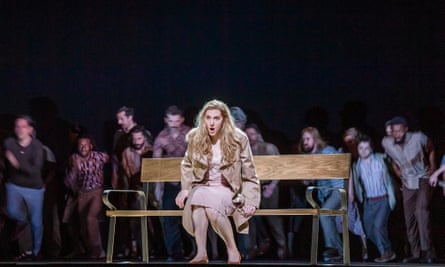Richard Jones’s new production of Kát’a Kabanová updates Janáček’s great tragedy of sexual guilt to the 1970s and relocates it to a small-town community, possibly in eastern Europe. It’s an angry, compelling piece of theatre, fierce in its compassion and often unsparing in its social and psychological detail, though whether the transposition ideally suits the work is debatable.
Janáček imagines Kát’a as a woman trapped in a loveless marriage within a hypocritically devout society, torn between her longing for fulfilment and her sense of religious guilt. Jones, however, plays the religious elements down, turning the opera into a study of sexual attitudes in a reactionary, provincial hell-hole, where his Kát’a, played by the American soprano Amanda Majeski, is viewed with suspicion as an unstable, if desirable outsider.
This is a world in which she is continuously watched and spied on. Libidinous men stare at her through the windows of the Kabanov house, while women turn their backs on her in the street. Susan Bickley’s rigid, ferocious Kabanicha treats her daughter-in-law with thinly disguised contempt, and, in a departure from the original narrative, peeps from behind the curtains to watch Kát’a return from her first tryst with Pavel Černoch’s dashingly attractive, if weak-willed Boris.

Some of it is unquestionably powerful. The failures, both emotional and sexual, of Kát’a’s relationship with Andrew Staples’s alcoholic Tichon are chillingly and insightfully drawn. There’s real chemistry between Majeski and Černoch in their love scene, and a forceful reminder, at the end, that in destroying Kát’a, Kabanicha has also fatally destroyed her own relationship with her son. Yet there are also lapses. Kát’a’s public confession of adultery takes place not in a church, but in a tram shelter, and the absence of religious imagery weakens its impact.
Musically, however, the evening is simply stunning. Majeski, in one of the finest house debuts of recent years, sings with remarkable commitment and radiance of tone, probing Kát’a’s tortured psyche and crises of conscience with unflinching veracity. She sounds exquisite as she reminisces about her childhood with Emily Edmonds’s pragmatic Varvara. There’s real rapture in her duets with Boris, and I can think of few interpreters who have made the soul-destroying misery of the final scenes quite so tangible or poignant. Černoch is very much her equal – warm in tone, ardent yet vacillating, and simmering with resentment at his treatment by Clive Bayley’s brutal Dikoj.
The rest of the cast are comparably formidable. Bickley is genuinely unnerving as she showers Majeski with scorn, manipulates Bayley and viciously dominates Staples, who keeps Tichon just the right side of empathy, so that we really feel for him by the end. Edmonds makes a spirited Varvara opposite Andrew Tortise’s nerdy Kudrjáš, the pair of them very much the voices of reason in an otherwise disordered world.
The production also marks Edward Gardner’s long overdue main stage debut – he conducted Mozart’s Il Re Pastore in the Linbury in 2006 – and he gives us a magnificent interpretation, inexorable in its momentum and perfectly attuned to both the score’s lyricism and its underlying sense of unease. The playing is faultless in its richness and detail.

Comments (…)
Sign in or create your Guardian account to join the discussion